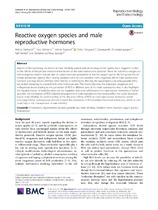Reactive oxygen species and male reproductive hormones
Date
2018Author
Darbandi, Mahsa
Darbandi, Sara
Agarwal, Ashok
Sengupta, Pallav
Durairajanayagam, Damayanthi
Henkel, Ralf
Sadeghi, Mohammad Reza
Metadata
Show full item recordAbstract
Reports of the increasing incidence of male infertility paired with decreasing semen quality have triggered studies
on the effects of lifestyle and environmental factors on the male reproductive potential. There are numerous exogenous
and endogenous factors that are able to induce excessive production of reactive oxygen species (ROS) beyond that of
cellular antioxidant capacity, thus causing oxidative stress. In turn, oxidative stress negatively affects male reproductive
functions and may induce infertility either directly or indirectly by affecting the hypothalamus-pituitary-gonadal (HPG)
axis and/or disrupting its crosstalk with other hormonal axes. This review discusses the important exogenous and
endogenous factors leading to the generation of ROS in different parts of the male reproductive tract. It also highlights
the negative impact of oxidative stress on the regulation and cross-talk between the reproductive hormones. It further
describes the mechanism of ROS-induced derangement of male reproductive hormonal profiles that could ultimately
lead to male infertility. An understanding of the disruptive effects of ROS on male reproductive hormones would
encourage further investigations directed towards the prevention of ROS-mediated hormonal imbalances, which in turn
could help in the management of male infertility.

